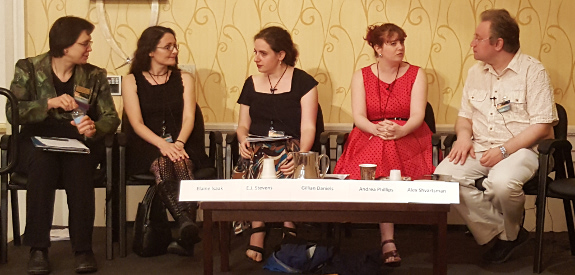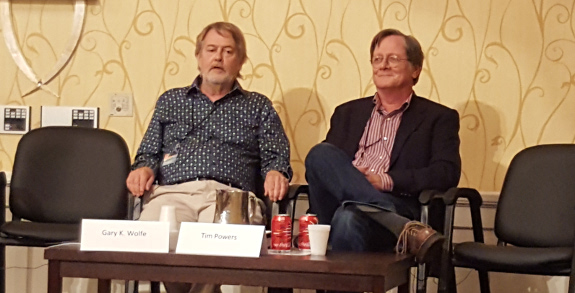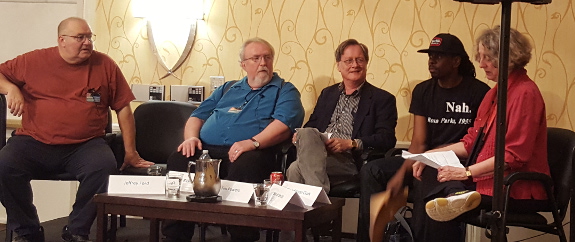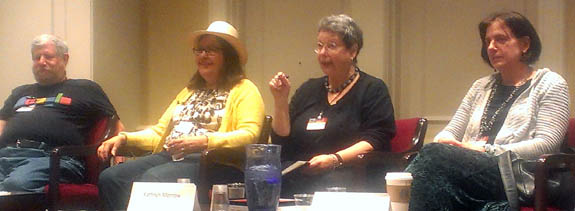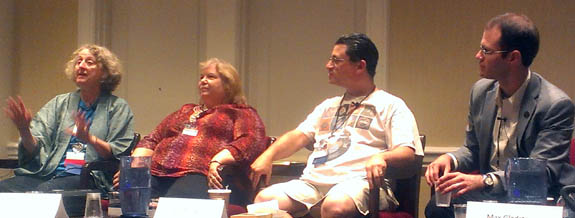Our day started bright and early as programming began at 9 AM. So, arise in time to be pressed and polished with moderately open eyes, and at least not tripping over our feet. Muffin and tea for each of us and off to the first program item.
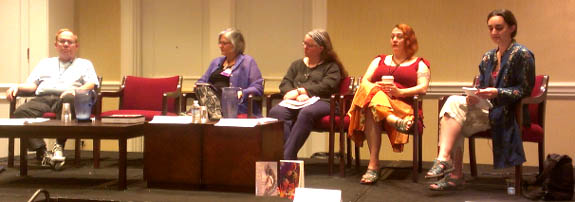
9:00 AM – Zombies as a Crisis of the Ecosystem: A Holistic Perspective.
Panelists: John Benson, LJ Cohen, Meriah Crawford, Catt Kingsgrave, and Gwendolyn Clare.
Description: Zombie plagues, like all pandemics, are ecosystem crises. What aspects of the human ecosystem make it possible for such a plague to spread? (Long distance air travel, say, or science fiction conventions.) What would its effects be on agriculture, infrastructure, labor availability, public health (aside from the plague itself), telecommunications, and other elements of human civilization? Where most disaster novels zoom in on the struggles of a few people to survive such a crisis, we will zoom out and consider large-scale, long-term questions.
Each of the panelists had some knowledge of the topic and could add their own bits of knowledge to the conversation. Basically, the discussion among the panelists was fairly free-ranging regarding the interconnectedness of our infrastructure and its vulnerability to disruption.
We, as humans, have come to rely on our technology. If a zombie outbreak occurred we would rapidly lose our transportation, GPS, electricity, water, and thus most of our food supply. In times past there would be storage facilities, but now we rely on ‘just-in-time’ manufacturing and delivery so the slimmer stockpiles of food and replacement parts would run out pretty quickly.
Depending on how the contagion would spread, rate of transmission, time between infection and showing the symptoms, things could happen over a very quick period. First responders would probably be the hardest hit and then people would be without general medical care personnel.
Then how would people react — bond together to survive, or every person for themselves? Would people panic and violate quarantine? If it was nationwide or worldwide how could you quarantine anyone? How would it end? Would the disease run its course? If it was a virus would it just start up again as those who survived came out of hiding?
This raised the question of how would civilization be re-established. If the outbreak lasted long enough, who would know how to grow crops, butcher a pig (or other edible animal, and would they be infected also), fuel would run out (how would people access what was in storage tanks). We’re on the cusp where most books are electronic; would the libraries survive the chaos and would they have the reference and how-to books needed to learn survival skills. What about medications? They’d run out and you’d need people who knew herbs and how to use them.
Most stories don’t deal with the psychological effects of the outbreak on those who survive. What happens after is rife with story possibilities.
10:00 AM – The Bookstore.
We decided to spend the next hour in the bookstore. We got to talk to a few friends while checking out the books. As usual we bought way too many books from Larry Smith since Paul remembered to bring his list of his already owned Girl Genius books so he could pick up what he was missing. I picked up a book that struck me as being different and interesting (aren’t they all) — even though it is volume two of a Steampunk series.

11:00 AM – When Should We Argue with Reviews?
Panelists: Amal El-Mohtar (leader), Adam Golaski, Michael Dirda, Resa Nelson, Vinnie Tesla.
Description: When is it appropriate to argue with reviews of your own work? The usual rule is “never”—but that “never” is a one-size-fits-all solution to an increasingly complex issue, especially when the categories of reviewer, reader, and writer are increasingly blurred. Is “appropriate” the same as “advisable”? What are the limits and ethics of responding to or arguing with reviews?
The general rule is that an author should never argue with a review. The panel thought this was a good guideline, but that no one rule covers all cases. One of the panelists said that a bad review was used as a blurb on the back of the panelist’s book because, to his mind, it stressed the factor that most people would find to actually be a good reason to read the book. Another panelist mentioned seeing a negative review of a book the panelist had read, and commented on the negative review in the panelists own review of the book because the panelist felt the review was more about the reviewer than the story.
In an age of social media the edges between reviewer, author, and readers have gotten fuzzy. Twitter, Facebook, and others allow people to read all about a person and their life without actually meeting them. Does that knowledge impact expectation when a reader picks up a book — whether that reader is a fan or reviewer. What if the reviewer is a ‘friend’? Mention was made of an author who didn’t like a review of the book that the author wrote, who then posted the reviewer’s name and phone number and asked fans to act in the author’s defense. Does that cross a line?
Personally, unless there’s a factual error in the review, it is probably best to just let it go.
At noon, Paul and I decided to go to different panels. I attended Insider Tips and Tough Truths of the Publishing Industry. Paul attended and will add his comments about the panel he attended, Our Panel of Experts….
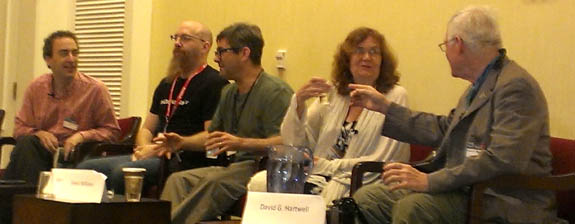
12:00 PM – Insider Tips and Tough Truths of the Publishing Business.
Panelists: Neil Clarke, Brett Savory, Gordon Van Gelder, Sheila Williams, and David G. Hartwell.
Description: SF/F publishing can seem intimidating and shadowy from the outside. This panel of experienced professionals in the field—authors, editors, agents, and others—will shed light on some of those dark corners and share insider secrets and other key information about the current state of the industry.
I’m going to just list some of the items the panel mentioned. Many of these items have been mentioned in books on writing but they really do need repeating.
* When submitting a story or book to an editor, mention that you’ve looked at other books/stories edited by this editor/press and feel it would be a good fit. Make sure that you actually did your research and that it does match with other things that have been published by this editor/press.
* Make your cover letter or pitch specific to the editor not ‘to whom it may concern’
* Don’t list all your previous rejections in your cover letter.
* Know your market. Don’t send a short story to a book publisher. Don’t send a novel to a short story publication.
* Real excellence will trump everything else but don’t count on it because it may not be as good as your friends and relatives tell you it is.
* Don’t resend a story that has been rejected to the same market unless you’ve been specifically asked by the editor to fix ‘x’ and then resend. If it is not clear, they didn’t ask.
* When sending a cover letter, keep it short. Include your name, mailing address, and correct email address.
* Editors share stories, so if you do or say something negative/awful/insulting about an editor or press they will hear about it. Same thing goes if you post it online.
* No agent is necessary for short stories, but are very, very helpful for novels.
* Most of the editors on the panel don’t like to get short stories that got rejected for an anthology — and they usually know about the anthologies that are collecting stories and can tell which one your stories might have been rejected from.
* Every editor wants to be the one to publish a new author. If your story is well written and interesting it has a chance provided you’re also professional in how you approach the business end of submitting your story.

12:00 PM – Our Panel of Experts….
Panelists: Chad Orzel, Scott Andrews (leader), Gwendolyn Clare, John O’Neil, Bud Sparhawk.
Description: Having trouble creating your world? Are there social complexities or changes in scientific laws that are confounding you? Bring your very specific questions about worldbuilding in your current project, and polymath scientists will do their best to answer. No advance sign-ups; five minutes of answering per question.
As stated in the description, this panel was more of a question and answer session, with people in the audience explaining problems they’d run into in their writing, and getting some suggestions on how to get over them. Naturally, being put on the spot did not exactly result in in-depth or rigorous answers, but the panelists managed to do a good job of pointing people in, if not the right direction, at least a direction they could work from.
Questions ranged from:
* Passing on knowledge from one generation to another, when there are no teachers available to hold the knowledge.
* Physical ways to actually make bizarre nano-tech aliens seem real enough to be believable.
* How to fix problem with 0g in asteroid mining.
* Time travel paradoxes.
The last one was interesting, given that the panelists, in general, believed that paradoxes in time travel weren’t really a problem. That almost all the time (you can create real ones if you try hard enough), paradoxes get resolved if you just look at them from a different frame of reference.
Programming from 1 pm to 3 pm didn’t really catch our interest that much. After that it was interviews with the guests of honor but we decided to go eat lunch. Then do some walking at the mall since we’d been sitting all day. By the time we got back it was the dinner break and there wasn’t any panels scheduled for the evening. From 8:30 – 9:30 there’s a Most Readerconnish Miscellany but it also didn’t grab us. We decided to write up the day, read for a while and make an early night.
Tomorrow is the last day of the convention and once we leave to head home we’re looking at a 10-12 hour drive. An early night is looking pretty good from here.







